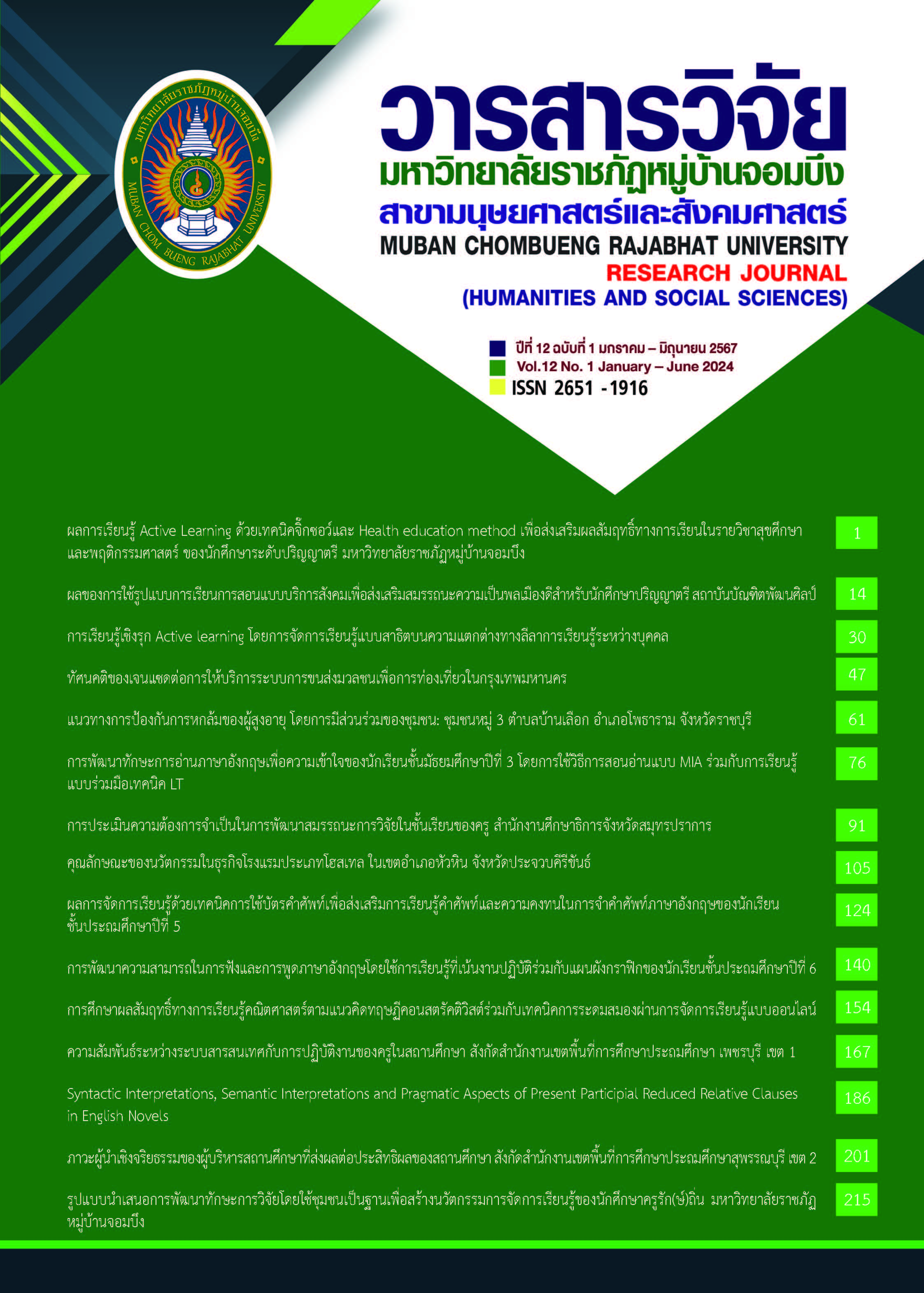ผลของการใช้รูปแบบการเรียนการสอนแบบบริการสังคมเพื่อส่งเสริมสมรรถนะความเป็นพลเมืองดีสำหรับนักศึกษาปริญญาตรี สถาบันบัณฑิตพัฒนศิลป์
คำสำคัญ:
รูปแบบการเรียนการสอน, สมรรถนะความเป็นพลเมืองดี, การบริการสังคมบทคัดย่อ
การวิจัยครั้งนี้มีวัตถุประสงค์เพื่อ 1) พัฒนารูปแบบการเรียนการสอนแบบบริการสังคม เพื่อส่งเสริมสมรรถนะความเป็นพลเมืองดี 2) ศึกษาผลของการใช้รูปแบบการเรียนการสอนแบบบริการสังคม เพื่อส่งเสริมสมรรถนะความเป็นพลเมืองดี กลุ่มตัวอย่าง ได้แก่ นักศึกษาระดับปริญญาตรี ชั้นปีที่ 2 จำนวน 30 คน โดยวิธีการสุ่มแบบหลายขั้นตอน เครื่องมือที่ใช้ในการวิจัย ได้แก่ 1) แผนการจัดการเรียนรู้โดยในภาพรวมมีความเหมาะสมอยู่ในระดับมากที่สุด (X = 4.89, S.D. = 0.14) 2) แบบประเมินสมรรนะความเป็นพลเมืองดี โดยมีค่าดัชนีความสอดคล้อง 0.80 - 1.00 ค่าความเชื่อมั่นเท่ากับ 0.78 3) แบบประเมินคุณภาพรายงานกิจกรรมบริการสังคม โดยมีค่าดัชนีความสอดคล้อง 0.80 - 1.00 สถิติที่ใช้ในการวิเคราะห์ข้อมูล คือ ค่าเฉลี่ยและส่วนเบี่ยงเบนมาตรฐาน และการวิเคราะห์ความแปรปรวนแบบวัดซ้ำ (One - way Repeated Measures ANOVA)
ผลการวิจัยพบว่า 1) รูปแบบการเรียนการสอนแบบบริการสังคมเพื่อส่งเสริมสมรรถนะความเป็นพลเมืองดีประกอบด้วย 5 องค์ประกอบ ได้แก่ (1) หลักการ (2) จุดมุ่งหมาย (3) เนื้อหา (4) กระบวนการเรียนการสอนมี 5 ขั้นตอนคือ ขั้นที่1 ขั้นเตรียมการ ขั้นที่2 ขั้นปฏิบัติการ ขั้นที่3 ขั้นสร้างความรู้อย่างไตร่ตรอง ขั้นที่4 ขั้นประยุกต์ใช้ในสถานการณ์จริง ขั้นที่5 ขั้นประเมินผลงาน และ5) การวัดและประเมินผล ซึ่งมีผลการประเมินคุณภาพของรูปแบบการเรียนการสอนในภาพรวมอยู่ในระดับมากที่สุด ( X = 4.89, S.D. = 0.17) 2) ผลการใช้รูปแบบการเรียนการสอนแบบบริการสังคมพบว่า ผู้เรียนมีสมรรถนะความเป็นพลเมืองดีทั้ง 4 ด้านได้แก่ ความสามารถในการทำงานเป็นทีม ความสามารถในการสื่อสาร ความสามารถในการแก้ปัญหา และความรับผิดชอบต่อสังคม เพิ่มขึ้นในแต่ละระยะ อย่างมีนัยสำคัญทางสถิติที่ระดับ .05
เอกสารอ้างอิง
กันต์ฤทัย คลังพหล. (2561). วิธีวิทยาการวิจัยการศึกษา. ปทุมธานี: คณะครุศาสตร์ มหาวิทยาลัย ราชภัฎวไลยอลงกรณ์ ในพระบรมราชูปถัมภ์.
ทิศนา แขมมณี. (2561). ศาสตร์การสอน. กรุงเทพฯ: สำนักพิมพ์แห่งจุฬาลงกรณ์มหาวิทยาลัย.
บุปผชาติ ทัฬหิกรณ์. (2552). การประยุกต์ใช้เทคโนโลยีสารสนเทศในการเรียนการสอน. กรุงเทพฯ: โครงการเทคโนโลยีสารสนเทศตามพระราชดำริ สมเด็จพระเทพรัตนราชสุดาฯ สยามบรมราชกุมารี ศูนย์เทคโนโลยีอิเล็กทรอนิกส์และคอมพิวเตอร์แห่งชาติ.
วรภัทร์ ภู่เจริญ. (2548). Learning Organization & Knowledge Management. พิมพ์ครั้งที่ 2. กรุงเทพฯ: อริยชน.
ศักดิ์ชัย นิรัญทวี, (2548). รายงานการวิจัยเอกสารการจัดการเรียนรู้เพื่อพัฒนาผู้เรียนให้เป็นพลเมืองดี. กรุงเทพฯ : พิมพ์ดีการพิมพ์.
สหัทยา พลปัถพี. (2548). การนำเสนอแนวทางการพัฒนาคนให้มีคุณลักษณะตามปรัชญาของเศรษฐกิจพอเพียง. กรุงเทพฯ: จุฬาลงกรณ์มหาวิทยาลัย.
สำนักงานเลขาธิการสภาการศึกษา กระทรวงศึกษาธิการ. (2560). แผนการศึกษาแห่งชาติ พ.ศ.2560 – 2579. (พิมพ์ครั้งที่ 1). กรุงเทพมหานคร: บริษัท พริกหวานกราฟฟิก จำกัด.
หล่มศรีว., & ภักดีวงศ์ภ. (2559). รูปแบบการจัดการเรียนรู้เพื่อพัฒนาความเป็นพลเมือง ตามระบอบประชาธิปไตยของนักเรียนระดับมัธยมศึกษาตอนปลาย. Academic Journal: Uttaradit Rajabhat University, 11(2), 287-302. Retrieved from
https://ph01.tci-thaijo.org/index.php/uruj/article/view/77118
Anderson, T. P. (1997). Using Models of Instruction. In C. R. Dills and A. J. Romiszowski (eds). Instructional Development Paradigms. Englewood Cliffs, NJ: Educational Technology Publications.
Joyce, B. & Wiel, M. (1986). Model of Teaching. Englewood Cliffs NJ: Prentice - Hall.
ดาวน์โหลด
เผยแพร่แล้ว
รูปแบบการอ้างอิง
ฉบับ
ประเภทบทความ
สัญญาอนุญาต
ลิขสิทธิ์ (c) 2024 วารสารวิจัยมหาวิทยาลัยราชภัฏหมู่บ้านจอมบึง สาขามนุษยศาสตร์และสังคมศาสตร์

อนุญาตภายใต้เงื่อนไข Creative Commons Attribution-NonCommercial-NoDerivatives 4.0 International License.
วารสาร TCI อยู่ภายใต้การอนุญาต Creative Commons Attribution-NonCommercial-NoDerivatives 4.0 International (CC BY-NC-ND 4.0) เว้นแต่จะรุบุไว้เป็นอย่างอื่นโปรดอ่านหน้านโยบายของเราสำหรับข้อมูลเพิ่มเติมเกี่ยวกับการเช้าถึงแบบเปิด ลิขสิทธิ์ และการอนุญาต



